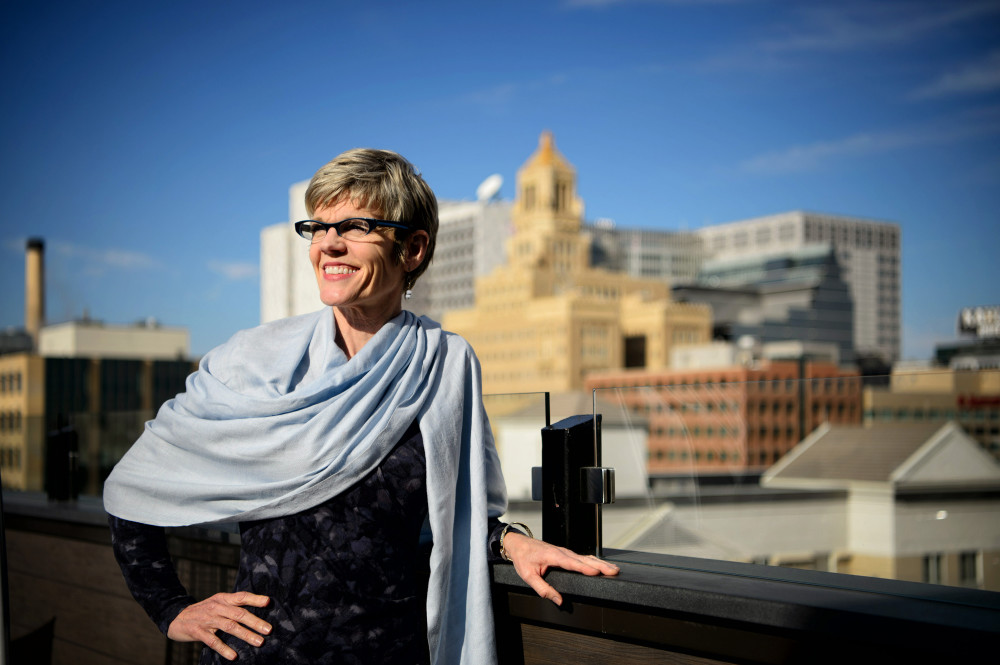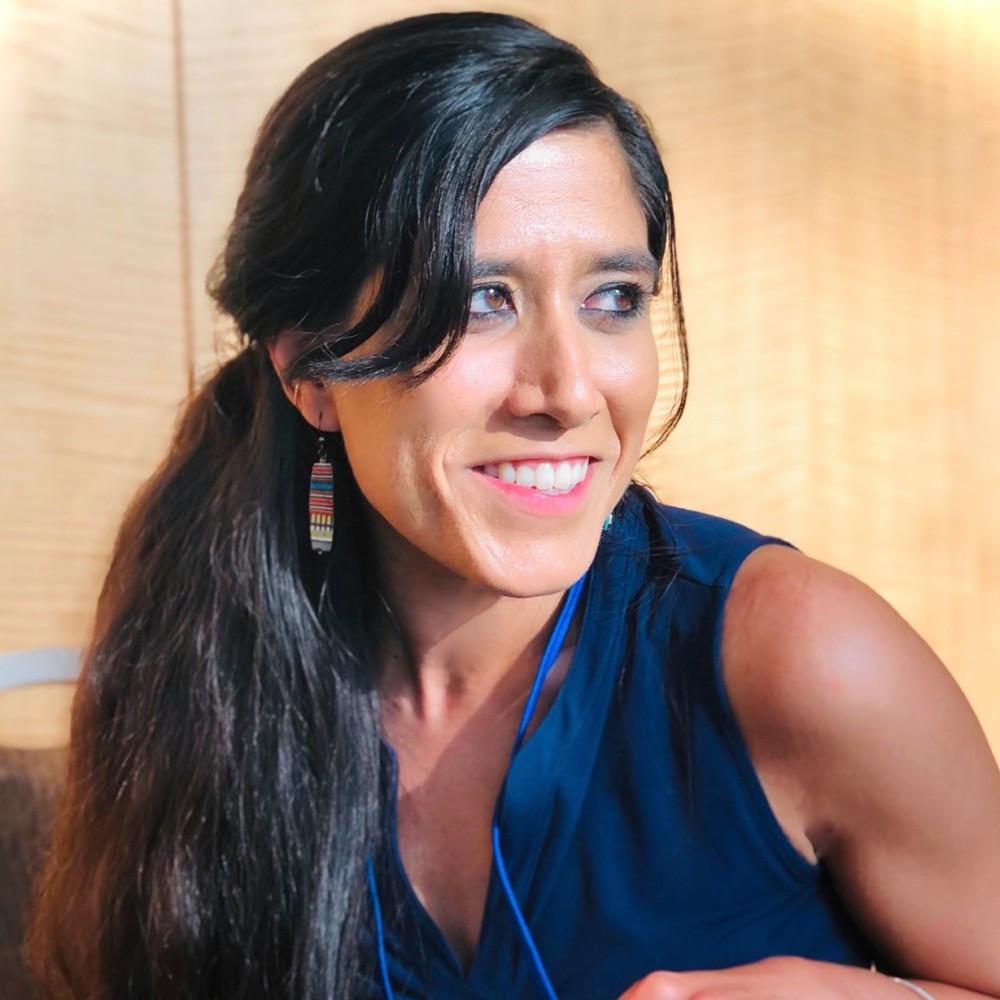By Matt McKinney
Star Tribune (Minneapolis).
ROCHESTER, Minn.
A pair of tennis shoes tucked into her bag, a water bottle at the ready, Lisa Clarke steps into a meeting in a busy morning full of them and drops a well-worn line.
“It’s a good day to be in Rochester,” she says, flashing a broad smile at those in attendance.
The extra shoes come in handy when she’s hurrying through the city’s skyways to her next thing. A packed schedule came with the job, as did a long title: executive director of the Destination Medical Center’s Economic Development Agency.
The title probably doesn’t ring a bell for most Minnesotans, but it should. The DMC will cost taxpayers more than the Vikings stadium. It will double Rochester’s population in a generation. It will bring tens of thousands of jobs. And, if all goes well, it will rain billions in new tax revenue as it cements the Mayo Clinic’s reputation for being the world’s premier hospital.
Standing at the intersection of all the groups trying to make this happen is Clarke, the project’s caretaker, traffic cop and chief cheerleader. Clarke isn’t the visionary behind the project, that falls to the Mayo and the city of Rochester, but Clarke is the project’s face.
“Certainly if I wanted to connect with anything DMC related, I would go right to Lisa,” said Tim Tripp, of the University of Minnesota’s Office of University Economic Development. “There would be no one else who would even come into my mind.”
RURAL CHILDHOOD
Growing up the daughter of a banker and homemaker in rural Wells, Minn., Clarke was the third child of four. She spent her school years taking advantage of what she considered the benefit of growing up in a small town: “You kind of get to try everything,” she said. That meant drama, cross-country running, basketball and track and field at Wells-Easton high school, home of the Wildcats. She played the bassoon in the school band and still loves the instrument’s distinct sound. “Love, love, love it.”
It was in college at the University of Wisconsin-La Crosse that Clarke found her interests spreading across several disciplines. Science, health, communications: “It was hard for me to pick one area. I could probably still be there,” she said. She left La Crosse with a bachelor of science degree. She later got an MBA at the University of St. Thomas.
After school, Clarke stopped playing music but kept running and saw her personal exercise rituals grow to include yoga and walking in the summer and swimming in the winter. She usually starts each day at 5:22 a.m., kicking off the day with a homemade double-skim latte (no froth).
Today, getting outside for a run is what she calls her creative time. “It’s just beautiful think time,” she said.
She was working for the YMCA when a friend told her about a public affairs job at Mayo. She would go on to spend 17 years there.
“It didn’t take me long to be a banner waver of Mayo Clinic,” she said. She had grown up knowing Mayo’s reputation, but it wasn’t until she started working there that she saw how Mayo handled patients, constantly asking if the hospital was serving the patient best.
The move to Mayo required leaving Minneapolis for Rochester, and her first impressions were mostly positive, she said. No traffic jams, for one thing, plus friendly people.
In 2009, when Mayo started talking about the health care environment, the DMC began to take shape. Clarke was there from the beginning. Mayo, in order to stay competitive with places like Johns Hopkins and the Cleveland Clinic, said it needed a massive reinvestment program that included a public commitment to make Rochester a first-class city.
It was Clarke who helped marshal DMC through the Legislature, said Gary Smith, president of Rochester Area Economic Development Inc.
“She’s a good listener, number one; she believes in what she’s doing, number two; and, number three, she knows what she doesn’t know,” he said. That last point means Clarke doesn’t try to take on tasks she’s not suited for, but instead delegates to good people, said Smith. “She’s not trying to do all this herself,” he said.
Just a few months after DMC’s passage in 2013, Clarke led a series of public meetings. Eight committees were created, each made up of locals representing a wide range of careers and backgrounds.
Rochester businessman Brandon Sampson, the founder of a prosthetics business called the Limb Lab, sat on a committee and recalls Clarke keeping everyone focused.
“I think one of the biggest fears people said is, ‘Is this just going to be something that’s forced upon the community?’ and I think they did a really good job of putting that fear at ease,” he said.
Clarke opened a street-level office in downtown Rochester this summer. It’s connected to the Rochester skyway, and, perhaps more significantly, it sits halfway between the Mayo Clinic and Rochester City Hall.
Tying together that partnership between the city and Mayo Clinic is a complicated, exhausting job, said Dr. Clark Otley, chairman of Mayo’s dermatology department and a DMC-EDA board member.
“She has a gigantic amount of energy,” he said. “The job she is doing is herculean, and we need a herculean person to do a job as busy and complex as this is.”
Some have lamented the project’s pace: It likely won’t reach the $200 million in private funding needed to release promised state funds until 2017. Clarke and others say more investment is coming, and that the size of the plan required a cautious and exhaustive planning process first.
In the past few months, Clarke has hired three staffers to handle communications, finance and administrative tasks. She also nabbed Patrick Seeb from the St. Paul Riverfront Corp., which he led for 20 years. Credited with helping to steer $4 billion of investment in St. Paul, Seeb has nursing degrees and has led medical organizations.
R.T. Rybak, the former Minneapolis mayor and current DMC Corp. board member, praised Clarke for her hiring of Seeb, calling him an “exceptionally strong” hire.
“Sometimes efforts like this have a very opinionated visionary at the center who tries to convince all the players of a direction. That’s not her,” Rybak said of Clarke.
It’s been Clarke’s job instead to get the state, the clinic and the community working together, making sure everyone feels they’re being heard, responding to the board’s concerns while seeking out public opinion, he said. In a city of 111,000 people with a clinic that employs 32,000, and a DMC board chaired by Lt. Gov. Tina Smith, there’s no shortage of opinions about what Rochester should become.
“She’s been about facilitating … and I think that’s been a very smart choice in this case,” said Rybak. “I’m not positive Lisa sleeps, but I know she gets a lot done.”
___
Lisa Clarke
Age: 54
Lives: Eyota, Minn.
Family: Husband, Colin Gentling, two stepdaughters, three grandchildren. Parents and two of three siblings live in Rochester area.
Hobbies: Running, yoga and swimming

















































































































































































































































































































































































